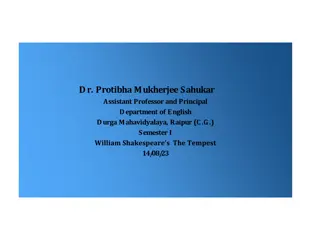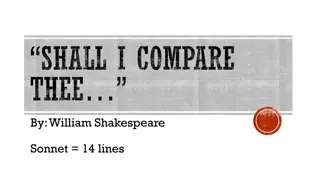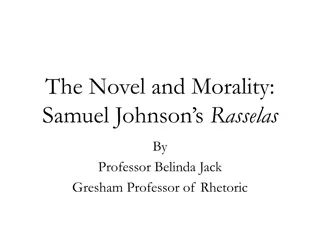Preface to Shakespeare by Dr. Samuel Johnson
Dr. Samuel Johnson (1709-1784) was a significant figure in English literature, known for his celebrated dictionary and prolific writing in various genres. In his preface to Shakespeare's works, Johnson discusses the tendency to favor past excellence over present, analyzing Shakespeare's enduring acclaim through his skillful characterizations and depiction of human nature. Johnson's evaluation underscores Shakespeare as a timeless literary icon deserving of established fame.
Download Presentation

Please find below an Image/Link to download the presentation.
The content on the website is provided AS IS for your information and personal use only. It may not be sold, licensed, or shared on other websites without obtaining consent from the author. Download presentation by click this link. If you encounter any issues during the download, it is possible that the publisher has removed the file from their server.
E N D
Presentation Transcript
Preface to Shakespeare by Preface to Shakespeare by Dr. Dr. Samuel Johnson Samuel Johnson
Dr. Samuel Johnson ((1709-1784) is one of the most significant figures in English literature. His fame is due in part to a widely read biography of him, written by his friend James Boswell and published in 1791. Although probably best known for compiling his celebrated dictionary, Language (1755), Johnson was an extremely prolific writer who worked in a variety of fields and forms. He founded his own periodical, The Rambler, in which he published, between 1750 and 1752, a considerable number of eloquent, insightful essays on literature, criticism, and morality. Johnson published another periodical, The Idler, between 1758 and 1760. Johnson's last major work, The Lives of the English Poets, was begun in 1778, when he was nearly 70 years old, and completed in ten volumes in 1781. The work is a distinctive blend of biography and literary criticism. the Dictionary of the English
In his preface to his edition of the collected works of Shakespeare, Johnson begins by noting that we often seem to cherish the works of the past and to neglect the present. Praises, he writes, are often without reason lavished on the dead as a result of which it sometimes seems that the honours due only to excellence are paid to antiquity . Everyone, Johnson suggests, is perhaps . . . more willing to honour past than present excellence; and the mind contemplates genius through the shades of age . [I]n the productions of genius, nothing can be styled excellent till it has been compared with other works of the same kind .
With this test in mind, Johnson suggests that Shakespeare meets these criteria and may now begin to assume the dignity of an ancient, and earn the privilege of established fame and prescriptive veneration because he has long outlived his century, the term commonly used as the test of literary merit . That he deserves such acclaim can be verified by comparing him with other authors . The question which arises is by what peculiarities of excellence Shakespeare has gained and kept the favour of his countrymen? .
Shakespeares perhaps most important skill concerns accurate characterisation: He offers representations of general nature rather than of particular manners peculiar to individuals or particular places and times. Johnson praises the Bard s characterisation in particular for its fidelity to human nature in general Shakespeare is above all writers . . . the poet of nature; the poet that holds up to his readers a faithful mirror of manners and of life. His characters are the genuine progeny of common humanity. His persons act and speak by the influence of thee general passions and principles.
Shakespeares scenes are occupied only be men, who act and speak as the reader thinks that he should himself have spoken or acted on the same occasion . Characterisation ample and general in this way, that is, his adherence to general nature , is supplemented by appropriate strokes of individuality. Even when dealing with supernatural matters, Johnson stresses, Shakespeare approximates the remote, and familiarises the wonderful. Whatever his subject matter, as Shakespeare s personages act upon principles arising from genuine passion, very little modified by particular forms, their pleasures and vexations are communicable to all times and to all places; they are natural, and therefore durable.
Shakespeares drama is the mirror of life from which other writers can learn much simply by reading human sentiments in human language. Moreover, if his characterisation is realistic, so too are his dialogues. Shakespeare has captured the enduring spirit of the English language. There is a conversation above grossness and below refinement, where propriety resides, and where this poet seems to have gathered his comic dialogue. The speech of each of Shakespeare s characters is so evidently determined by the incident which produces it, and is pursued with so much ease and simplicity, that it seems scarcely to claim the merit of fiction, but to have been gleaned by diligent selection out of common conversation, and common occurrences .
One of the criticisms commonly made of Shakespeares plays was that he did not follow the prescribed rules. Shakespeare is guilty of blurring the genres of tragedy and comedy which ought to be distinct. The ancient poets, out of the chaos of mingled purposes and casualties and according to the laws which custom had prescribed , had selected, some the crimes of men, and some their absurdities; some the momentous vicissitudes of life, and some the lighter occurrences; some the terrors of distress and some the gaieties of prosperity . It was for this reason that there rose two modes of imitation, known by the names of tragedy and comedy. comedy was defined simply as an action which ended happily to the principal persons, however serious or distressful through its intermediate incidents . To be a tragedy, similarly, required only a calamitous conclusion , as a result of which plays were written, which, by changing the catastrophe, were tragedies today, and comedies tomorrow .
Shakespeares work has been divided into tragedies, comedies and histories. Comedy was defined simply as an action which ended happily to the principal persons, however serious or distressful through its intermediate incidents . To be a tragedy, similarly, required only a calamitous conclusion . Histories were viewed as plays consisting of a series of actions, with no other than chronological succession, independent on each other .
Shakespeares plays are neither tragedies nor comedies in the strict sense of these terms, but compositions of a distinct kind; exhibiting the real state of sublunary nature which partakes of good and evil, joy and sorrow, mingled with endless variety of proportion and innumerable modes of combination; and expressing the course of the world, in which the loss of the one is the gain of the other. Shakespeare has united the powers of exciting laughter and sorrow not only in one mind, but in one composition as a result of which almost all his plays are divided between serious and ludicrous characters . Shakespeare s mode of composition is always the same: an interchange of seriousness and merriment, by which the mind is softened at one time, and exhilarated at another . Johnson justifies Shakespeare s mingled drama on the grounds that the mixture of sorrow and joy is more realistic and, thus, morally instructive.
Shakespeares failure to respect the unities of action, time and place With regard to the unity of action, Johnson argues that the laws applicable to tragedies and comedies are not applicable to Shakespeare s histories. All that is required of such plays is that the changes of action be so prepared as to be understood, that the incidents be various and affecting, and the characters consistent, natural, and distinct. No other unity is intended, and therefore none is sought . With regard to the unities of time and place, Johnson argues that these are not essential to a just drama . All this does not matter, Johnson argues, because spectators are always in their senses and know . . . that the stage is only a stage . Vraisemblance (likelihood) is not adversely affected, firstly, by changes in location. Secondly, he argues, time is obsequious (attentive) to the imagination; a lapse of years is as easily conceived as a passage of hours.























